Homilies by Revd George Kingsnorth (Deacon)
Shortly after being ordained as a Permanent Deacon, a fellow Deacon and Creative encouraged me to turn my homilies into videos and to publish them every week. Now another friend has suggested I turn the current 75 x approx 5 minute videos in a series of post casts. So here they are. I hope you find them useful.
Episodes
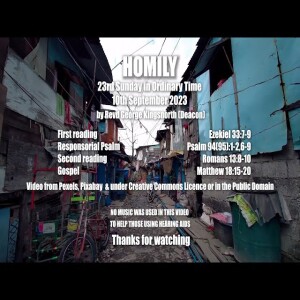
Saturday Sep 09, 2023
Homily - 23rd Sunday in Ordinary Time - 10th September 2023
Saturday Sep 09, 2023
Saturday Sep 09, 2023
Homily23rd Sunday in Ordinary Time10th September 2023The words said in our reading today may seem quite harsh in our upside-down world. Even when I was a youngster, I heard friends say that something was ‘wicked’, meaning in slang they were describing something as being ‘wonderful’, ‘great’ or cool. More recently, people have described something as being ‘bad’ meaning to them it is ‘good’. Much in our world can be confusing. We are all being held as sentries in this world because the house of God includes our bodies, the temples of the Holy Spirit. When the Holy Spirit moves us, it is for the betterment of other people, not for our own self-interests. We are to be God’s witnesses, to confess our faith in Jesus and that we love him. Paul tells us not to get into debt unless it is the debt of mutual love. Love cannot harm another person. If we love others, we fulfil our obligations and our purpose for being here on Earth. Nothing else matters. By loving our neighbour with all our heart, we cannot break the Ten Commandments. Both Ezekiel and Jesus remind us of our responsibilities to others. When the Holy Spirit moves us, we are to tell a person when they are breaking God’s laws. If we resist the Holy Spirit, and the person dies, we will be held responsible for their death. Why? Simply because if we tell them, they have a chance to repent, to be forgiven, and be allowed to return to God. Without saying a word, we prevent them from doing this. By telling them of their wrongs, we are showing our love for them. The Psalm tells us not to harden our hearts, but to listen to God’s voice calling to us to act on his behalf. Jesus instructs us to take our brother or sister aside and quietly tell them of their wrongdoing. They may not be aware their actions are offending God, and this is the first opportunity for them to realise the situation. They now have an opportunity to say they are sorry. On the other hand, they may rebuke you and not listen, having no regard for the damage they are doing to their own soul. In this case, Jesus tells us to take two or three others who have witnessed the sin and to present their evidence. When two or three are gathered in Jesus’s name, he will be their also. If the transgression continues, and what the three have said is disregarded, then it is the whole community who takes responsibility to present the charges against the person. Each step is to be taken in love to provide every opportunity for the offender to turn away from their crime, confess and be forgiven, even though there is still reparation to be given for the harm they have done. Therefore, how do we determine that someone has done something wrong? In simple form, there are three parts to each action: what we do, why we do it, and the consequences of the action taken. Our intention, why we act the way we do, comes from the individual’s heart. We are responsible for our own actions. The Catholic Church encourages us to regularly examine our conscience to ensure we are following reasoned judgment and that our actions conform to the will of God. The world we live in encourages us to be individualistic, often working against our communities and tradition. This can lead us to a distrust in traditional rules and norms, especially if those rules and norms become overly legalised. Love is an essential part of building a moral life, but in a world that over romanticises the meaning of love, we can be led away from understanding that love also mean sacrifice. Sacrificial love is required to be able to make the tough moral choices we often face in this world. We have a habit of thinking that deep down we are good, even though our recent actions may have been bad. Culturally, our society encourages us to separate our action from who we believe we are. Yet, as time goes by it is our actions that define the person we are, and the consequences of those actions can lead us to regret what we have become. The moral dilemmas in our society are still related to the dignity of Every Human Life. Whether this is the unborn child, whom the Catholic church cherishes from conception. Or the young woman leaving her country, believing she is going to a better life but finds herself caught up in Human Trafficking and a life of prostitution. Or a young person struggling with their identity and being bombarded with ideas that may lead them to physically changing their body before they are mature enough to make an informed decision. Or an old person, thinking they have nothing to offer the world and being encouraged to end their life. We as a community, are also responsible for the moral errors in judgment made, if we ignore when the Holy Spirit motivates us to have our voice heard. Our actions: Are they virtuous? Do they safeguard the dignity of every human life? And do we conform to the Natural Law of God’s will? These are the moral questions we need to ask ourselves.
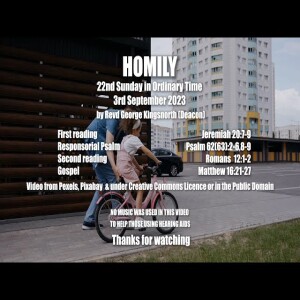
Saturday Sep 02, 2023
Homily - 22nd Sunday in Ordinary Time Year A - 3rd September 2023
Saturday Sep 02, 2023
Saturday Sep 02, 2023
Homily22nd Sunday in Ordinary Time Year A3rd September 2023A year ago, I was encouraged by a fellow deacon to start using my talents as a filmmaker to produce a series of video homilies. There was a desire within me to want to make such videos, but I must admit there was also a lot of fear. In putting out these videos, I was going to be putting myself our there and stating to the world, I am a Christian, and a Catholic Christian at that. This was a discomforting thought. For years, I had been talking to people about my faith and we shared our experiences. I attended quite a few Alpha Courses. But the question always came back, was I prepared to openly confess my conviction in being a Christian, a follower of Jesus Christ?Jeremiah mentions how much he was mocked, each time he went out to say what God had told him too. Daily he was made a laughingstock, the butt of everyone’s jokes simply because he was overwhelmed by the spirit within him to proclaim God’s word, to tell the people of their sins. They had offended God through what they said, the actions they took against others, and how they refused to help those in need. Even Jeremiah had considered turning his back on God because of the daily insult he had to endure. In the end, the spirit within Jeremiah’s heart, drove him like a fire into action, the message had to come out. Paul tells us to model ourselves on God, both in body and mind. We need to think the way God thinks. We need to know the boundaries placed there by God, so we can do what is right and what is good. The challenge to us is not to follow the way the world is tempting us, through social media, and entertainment. Our world today is full of confusion, which is designed to evoke our emotions, to stir us up without thinking. Often subjects come up we don’t want to get into, because the topic is too toxic to even want to contemplate. Yet, certain ideas are pushed around, and our emotions are played on to force us to take sides. Peter was horrified at what he heard Jesus telling the disciples that he would go to Jerusalem, be treated badly by the temple authorities that would lead to him being put to death. He was so blinded by the idea of seeing his friend tortured and crucified, that he was made dumb, so he could not hear Jesus saying he would rise again on the third day. Satan had confused Peter to the point he was now blocking Jesus from fulfilling his mission. If we follow God’s way and not man’s, we will see Jesus in God’s glory with all his angels, and our reward will be based on how we act.We are told that this generation has only an attention span of about 3 seconds, a bit like a goldfish, but where does this idea come from? On Facebook, Instagram, and other platforms, we are given images for three seconds to look at, and then they are taken away. How many times have I seen an image of my grandchildren, where a picture tells a thousand words, yet I am only able to read 9 words. The other nine hundred and ninety-one are ripped away from me before I get a chance to read them. People stand in art and photography galleries gazing at a single image for hours, soaking up the expressiveness, the textures, the hidden meanings and much more as part of their process of getting inside the mind of the artist. Yet we are not being given the time to appreciate what is dished up in front of us and expected to consume in a moment. I know I get frustrated. With such actions constantly bombarding us every waking minute, we can find we have no option but to switch off, everything becomes a blur, as our minds ore fogged up, unable to buffer the content before us.If you have been trained in the creative arts, you will have spent years training and honing your craft and skills. Yet, we are heading into a time where AI can reproduce, in a matter of seconds, hundreds and thousands of images, without taking a break, copying the styles and actions of all these artists to the point where they cannot compete. Human ambitions have driven this race, robbing the creativity within each of these talented people. God’s will is we should become co-creators with him. He knows the sacrifices creative people have made, to make their amazing art, to which the soulless artificial intelligence can only mimic without any heart. Jesus tells us that if we focus on worldly gains, we will lose our soul. We are encouraged to sacrifice earthly gains by prioritising the values that lead to an eternal life. The machines are only tools. If they become self-perpetuating, we may be fooled into believing we have no purpose, but this is a lie. Jeremiah was encouraged not to give up, even though he was weary of the rejection. Paul tells us not to conform to the philosophies of this current age. Jesus reminds us that if we go our own way we will lose our souls, but if we can trust in him and place him at the heart of our lives, the sacrifices we make, will bring the reward we deserve.
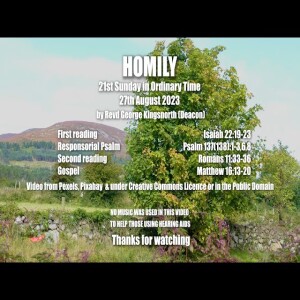
Saturday Aug 26, 2023
Homily 21st Sunday in Ordinary Time - 27th August 2023
Saturday Aug 26, 2023
Saturday Aug 26, 2023
Homily21st Sunday in Ordinary Time27th August 2023This week I saw my mum digging up a small tree and planting it in another part of the garden where she thought it would be more fruitful. On her way back to the house she commented to me that she was concerned that the ash tree was dying, the branches were not growing out of the trunk as they should have been. Her remedy, to wait until late October, when the sap had gone down so she, or perhaps now me, could prune back the branches to allow new growth to occur next spring, when the sap would rise again. Another gardening trick, which Paul mentions in his letter to the Romans, is called grafting, where a branch from a different plant is grafted into the trunk of another that is well rooted. The reason grafting is valuable is that it allows the cultivation of new varieties, helps cross-pollination by taking advantage of the rootstock and helps to increase the growth of seedlings. Grafting also helps identify viruses, when a twig from an infected plant is grafted to a stronger rootstock, the symptoms become more obvious. Paul refers to the rootstock as being the Jewish people and the grafted twig refers to the Gentiles. He reminds us not to become boastful of our lofty position high up in the branches because it is only through the sap coming up from the roots that sustain us with the nourishment we need. It is only possible for the twig to flourish in its new position because an original twig has been pruned out to allow space for grafting to occur. Grafting can only be done during Winter months when the plant is dormant, and the sap has receded. With Shebna being removed as the master of the palace, we see God removing the dead wood from the rootstock, because Shebna had taken advantage of his position to the point of even having a tomb carved out of the rock which he had no right to do. Eliakim was being grafted into the place that had been opened through Shebna’s removal. God entrusted Eliakim with his authority, allowing him to be responsible for the keys to the House of David, knowing that with the Holy Spirit flowing through him, like the sap flowing from the roots, through the trunk into the branches he would become a throne of glory. Paul asks us to consider how rich are the depths of God? Though this may be impossible to fathom, we are reminded that it is only through God that everything exists. And that it is God who knows all of us to the depths of our souls, as he is our root, and the Holy Spirit gives us the nourishment to grow. When Jesus asked his disciples “Who do people say the Son of Man is?” they looked at the branches that had previously flourished from the trunk, John the Baptist, Elijah, Jeremiah and other prophets. It was the Holy Spirit welling up through Simon Peter that allowed him to see Jesus as the Christ, the Son of the living God. Jesus told Peter this had been revealed through the Father working through him. As God the Father had given Eliakim the keys to the House of David, Jesus was passing the keys on to Peter, as the rock he would build his church on. With the keys came the power and authority to lock things away or unlock them. What was allowed on Earth would be allowed in Heaven, what was disallowed on Earth would be disallowed in Heaven.In Acts, when Pentecost came all those gathered who had been filled with the Holy Spirit were allowed them to share the Good News with people from many nations who heard it in their own language. Peter stood with the Eleven Apostles and address them all and opened the mysteries of heaven, fulfilling his responsibility as keyholder. He professed to all of Israel that Jesus, who had been crucified, had risen, and gone to Heaven to sit at the Right hand of God the Father, who had been made Jesus Lord and Christ.In our day, for the church to flourish, we need to remain grafted to the root which supplies us with the nourishment that comes from the Holy Spirit. If we choose to believe that we know best and abandon the ways of our faith, like Shebna, we will wither, die, and be pruned away. This will allow new growth by those who are grafted to the trunk who accept the life-giving sap of the Lord. Eliakim and Peter proved themselves to be worthy and were given the keys to the kingdom.Peter made many mistakes, repented and was forgiven, demonstrating God’s patience with us. By remaining faithful we will continue to receive the lifegiving sap and flourish.This Autumn, in our garden as the sap settles within the tree trunk, the dead wood will be pruned away with the hope that next Spring new growth will appear.
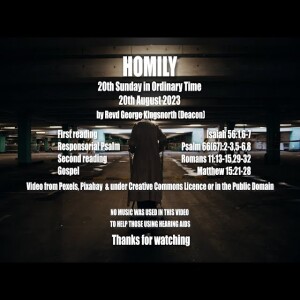
Friday Aug 18, 2023
Homily - 20th Sunday in Ordinary Time - Sunday 20th August 2023
Friday Aug 18, 2023
Friday Aug 18, 2023
Homily20th Sunday in Ordinary TimeSunday 20th August 2023All our readings this week talk about the outsider, those not part of the in-crowd. The ones most people look down on. The foreigners, the pagans, the other ones. The prophet, Isaiah lived at a time after the Northern Kingdom of Israel had been conquered by the Assyrian Empire, and the Southern Kingdom of Judah had been ravaged by the Babylonians. Those who had survived were in exile. The temple had been destroyed and there was no altar. Pre-exile religious practises had to be changed and new forms of worship developed, including “fixed prayers; public fasts; … confessions”; and gatherings to study the Torah. There were no formal places to worship, which led to the setting up of literary centres that helped nurture the community. A key feature of the Israelite’s faith was keeping the Sabbath, which also attracted interest from non-Jews drawn to the hope of being accepted by the Lord when the house of God was re-established at some future date, after the Israelites' exile and returned to Jerusalem.Paul’s mission was to evangelise the pagans so that all those who were prepared to be obedient to God would be saved. Often these days, many people struggle with the word obedient. To obey. But obedience is about being willing to comply with a request, to be happy to follow a certain way of life that enables us to live as we wish others to have the opportunity to do. To love one another as oneself. The Golden Rule is to “treat people the same way you want them to treat you” (Matthew 7:12). To be able to achieve this, there needs to be rules. Most games have rules to maintain fair play, so no one cheats. Paul reminds us that at some point in life, we all have rejected God when we have fallen into sin. Yet, as we have now changed our ways and become acceptable to God, those who currently reject him are loved because of their heritage. God accepts our free will and our right to choose. Our disobedience is our prison, but we continue to have a choice to follow God’s way which frees us from our prison. Likewise, we should be prepared to accept others who may seem foreign to us but are also God’s children and wish to follow him. Jesus knows everyone’s hearts, and that all who listen to his voice belong to him and will follow his way.Matthew was also an outcast. He was a tax collector, hated by the Israelites for taking from them and giving to Casear, often unjustly. Yet when he heard Jesus’s call, he instantly followed and changed his ways. Yet, many struggled to accept him into the fold because they judged him on his sins and had not forgiven him. They too had to change their ways, as no one else is our judge other than Jesus. Matthew tells us about Jesus visiting Gennesaret (gih Ness uh ret), near the region of Tyre and Sidon. Originally, God had given this region to the tribe of Asher. Still, because of their disobedience, they found the area well-defended and were forced to live alongside pagans who served foreign gods. Jezebel, who had brought much evil to the Israelites, was a princess of Sidon. Through Jezebel’s influence, the Israelites abandoned God for the likes of Baal. Elijah had to flee for his life because he had demonstrated the Lord was more powerful than Baal and had caused the death of Jezebel’s 400 oracles. It was quite a struggle to practice the Jewish faith. The Canaanites had lived right across the region, which had been promised to the Israelites after the Exodus from Egypt. The Canaanite people were a mix of different races. When Jesus visited this region with his disciples there were mostly gentiles living there. They were opposed to Israel’s God. So, when the Canaanite woman approached Jesus and asks for his Mercy to save her daughter, his response appears harsh. “It is not right to take the children’s bread and throw it to the dogs”. Often when Pharisees talked about non-Jews they would use the Greek word for dog which suggests they were “street mongrels”, similar to our term “strays”. Instead, Jesus used a word less harsh referring to pets, animals that are cared for. In our culture, pets are often treated the same way as children, being given the same love and care. Yet, the children can come to the table and the pets remain on the floor, but they are both welcomed in the house. So, although the Canaanite woman might be shunned by the Pharisees, Jesus treated her like a lost sheep who heard his voice and came to him for help. In her response, the Canaanite woman recognised the hierarchical system that was dominant in her society. Yet she also demonstrated she knew the only way to be saved was through Jesus and had the humility to ask simply for the crumbs that fell from the table, knowing they were enough to save. We are encouraged to not be blinded by our own prejudices and to see all humans have the right to be saved through Our Lord Jesus’s blessings and grace. He is the judge, not us.
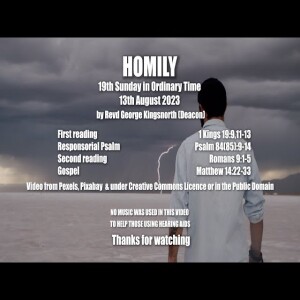
Friday Aug 11, 2023
Homily - 19th Sunday in Ordinary Time - Sunday 13th August 2023
Friday Aug 11, 2023
Friday Aug 11, 2023
Homily19th Sunday in Ordinary TimeSunday 13th August 2023In the Christy Moore song "The Voyage", written by John Duhan, in the chorus is the line “Life is an ocean and love is a boat in troubled water that keeps us afloat”. The story is of a couple setting out in life. The voyage through their life they see their family grow like the crew of a ship. To make things work, it is all about building strong relationships that will last the full journey, even though they don’t have a destination marked out on their chart.As the family grows and the children become adults, it is not long before there is a flotilla of boats, each struggling to navigate the storms experienced in life. Love within the church, as in the body of people who make up the church, can also be represented as a ship trying to navigate the perils of an ocean voyage, facing hurricanes and tsunamis. Even trying to dock at a harbour these days may be fraught with many islands around the world being devastated by wildfires through global warming. In recent weeks we have seen the islands of Rhodes and Corfu, also on the Greek peninsula, and across Turkey. This week Hawaii’s second largest island, Maui, has seen great losses and 80% of the town of Lahaina being destroyed. It is at these times, many struggle with their faith. We see in today’s Gospel, the apostles are out in their boat in the Sea of Galilee, which was often prone to choppy waters and strong headwinds. The apostles were battling their way through a violent sea. The fourth watch is between 3 am to 6 am the last watch of the night, so not only was it frightful weather but also dark. The fishermen were disorientated and terrified of drowning.Peter had seen Jesus walking on water, coming towards the boat. When Peter recognised him, he only had listened to Jesus’s instruction to do the same, “Lord, if it is you, tell me to come to you across the water.” Jesus did tell him but when Peter realised what he was doing, and to him how impossible this was, he began to sink. He pleaded for the Lord to save him. Jesus put out his hand to Peter and held him. Once they were both in the boat the storm stopped. The reason the apostles were in the boat in the first place was because Jesus had sent them on ahead. He wanted them to weather the storm and have courage. At the time of Elijah, Israel suffered from drought and famine. Most of the people had abandoned God turning to Baal. Elijah was a lone voice but was seen as the scourge of Israel by the prophets of Baal, who numbered 400. On Mount Carmel, King Ahab called the Israelites together. Elijah challenged the other prophets to sacrifice to their god, while he would do the same to the Lord. Two bulls were prepared as a burnt sacrifice but not set on fire. The 400 prophets called on their god to bring down fire. From morning to midday, they called on Baal to bring down fire, but nothing happened. Elijah called on the people to come to his side, he repaired the Lord’s altar that had been smashed, placed the sacrificial bull on it and dug a trench around it. Three times Elijah asked for water to be poured on the sacrifice and into the trench until it overflowed. For anyone who has ever lit a fire, wet wood is not what you would use. Elijah called to the Lord. Fire fell from heaven consuming the burnt offering, the wood, the stone altar and even the water in the trench. The Israelites fell on their faces crying, “The Lord is God. The Lord is God”.The 400 hundred prophets were seized and put to death by King Ahad. By the time he returned to the city of Jezreel, the sky was full of dark clouds and the rain was pouring. The king’s wife, Jezebel threatened to have Elijah killed and he fled for his life. He was so disturbed he wished he was dead. Twice an angel provided food and drink for him, then sent Elijah to Mount Horeb, God’s Mountain. It was there that God met Elijah after hearing the gentle breeze. All God was asking was for Elijah to trust in him that he would always be with him. Likewise, as we journey through the sea of life, we tend to want to hide away in some dark place. Jesus asks us not to be afraid of the storms ahead of us, but to have faith and courage to know he is with us. And when we accept him into our lives, as one of the crew anything is possible, as Peter found when he too walked on water.
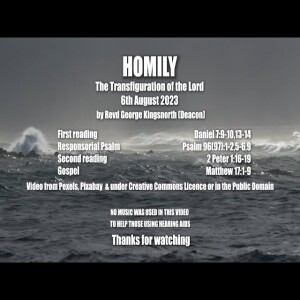
Friday Aug 04, 2023
Homily The Transfiguration of the Lord - Sunday 6th August 2023
Friday Aug 04, 2023
Friday Aug 04, 2023
HomilyThe Transfiguration of the LordSunday 6th August 2023 How many of us would react as Peter did when Jesus told him he would suffer dreadfully under the persecution of the chief priest, the elders, and the learned writers. Jesus even told his close followers that he would be put to death. Peter tore his hair out with anxiety, he may have not even been listening to him when he also revealed that he would be resurrected three days later. Peter’s mind was so clouded by the thoughts of losing his friend he blurted out, “Heaven forbid, Lord, this cannot happen.” All of Peter’s thoughts came to a screeching halt of what Jesus said to him next. “Get behind me, Satan! You are a stumbling block to me. You don’t think like God but as a human.”Peter was doing exactly as many of us do when we are faced with a problem beyond our comprehension. We stress out. We become blind by such overwhelming possibilities, and we want to take control even when it is beyond our means to do so. What Jesus then told Peter and other his disciples, was to let go.I am watching a television series called ‘Manifest’. One of the main characters obsesses on trying to solve the problems he faces, tries to do everything on his own, and is constantly being told by his family and friends to let them in to help. When he doesn’t, he continually gets things wrong.In our own lives, how many of us struggle to allow others in. Our headstrong ways want us to fix things, to make them right, but all we do on our own is get things wrong. We constantly make mistakes, going our own way.Jesus tells us that we must renounce ourselves, to give up our selfish ways. No matter how much we try to save our lives we will not be able to. If we gain the whole world when our lives end, we will lose everything. We are given crosses to bear throughout our lives, but these are set there to test us. To see if we will try to solve the problem alone or allow others in to support us. Most importantly, the test is to see if we will let Jesus in to save us. Life is the most precious gift God has given us.By tell Peter to stop thinking in a human way, and allow God to do things his way, Jesus, the Son of man was going to come into the glory of his Father with his angels, and then he would reward each one according to our behaviour. (Matthew 16:27)Peter, and the brothers James and John, were Jesus’s closest disciples. Many times, he took them aside to explain parables and accompanied them to witness miracles. Later, when Jesus grappled with thoughts of his impending Passion, he took the three disciples to be with him, though their spirit was keen, their flesh was weak.Jesus took him and the two brothers up a high mountain six days after rebuking Peter for his human thinking. They witnessed Jesus’ transfiguration, Moses and Elijah standing beside him and heard the voice of God reveal that Jesus was his Son and to listen to him. Peter confirms want happened in his second letter, seen as a farewell letter before his own death, where he teaches about the Second Coming.Jesus had shone like the sun and what he wore dazzled brightly. The two men who Jesus spoke with were Moses and Elijah. Moses had been given God’s Ten Commandments, The Law, and Elijah was the prophet taken up to heaven in a chariot of fire with horses of fire. Daniel’s description of heaven sees God sitting on a throne of blazing fire, with wheels ablaze with fire, and a stream of fire pouring out of his presence. A million Angels waited on him and there were, in Daniel’s estimate, 100 million people waiting to see the son of man arriving on the clouds of heaven. There could easily have been 8 billion or more. He would be granted sovereignty, glory, and kingship over all the peoples of the world, and nothing would be able to stand again his empire. At the end of Matthew’s Gospel, after Jesus’s resurrection, the eleven disciples made their way up a mountain as he had instructed them. Jesus appeared before them, saying “All authority in heaven and on earth has been given to me. Go, therefore, make disciples of all nations; baptise them in the name of the Father and of the Son and of the Holy Spirit, and teach them to observe everything I have commanded you.” As we seek to know the truth, God provided Moses with the Law and Elijah was one of his prophets. Both show the way to Jesus, as the Paschal Lamb who takes away the sin of the world. The Bible shows us, both in the Old and New Testaments how we should follow Jesus and not our own way. The Bible is also graphical in telling us what can happen if we follow our own way and the disasters we can bring upon ourselves. We only need to watch the news about what humans have done to our planet to cause global disasters. If we try to solve the problems without God, we will simply become stumbling blocks. Now is the time to recognise Jesus as God’s Son, let go of wanting to control everything, and listen to him.Amen.
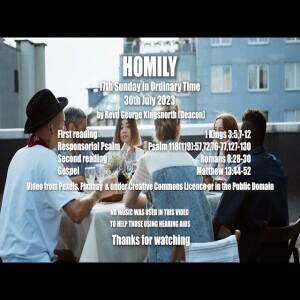
Friday Jul 28, 2023
Homily - 17th Sunday in Ordinary Time - 30th July 2023
Friday Jul 28, 2023
Friday Jul 28, 2023
Homily17th Sunday in Ordinary Time30th July 2023In the Book of Revelations, chapter 3 verse 20, Jesus says “Look, I am standing at the door, knocking. If one of you hears me calling and opens the door, I will come in to share a meal with the person and that person with me.”How many of us are dumb because of our earphones blocking us from hearing Jesus at the door? How many of us have bolted the door, set the alarm in the hope that no-one will dare to come and knock on our door? Do we have a locked gate at the end of the drive that prevents Jesus from coming up to the door to knock?One of the conversations I had this week was with a priest who mentioned everyone is spending their time striving to achieve things. Striving to make ends meet to be able to pay the bills, striving to do well in their job to get a promotion, striving to be something important to advance their careers. But the sacrifices being made are neglect of spouses, neglect of children, and neglect of building a home. Our relationships become broken. We become blind to what is important. Solomon was overwhelmed by being given so much responsibility after being made king. He had what we would call today ‘imposter syndrome’, a psychological problem where high achievers doubt their capabilities. Solomon recognised God was the one who put him in this position. He was young and inexperienced. In today’s world how many of us would be praying to win the Lottery assuming that being given so much wealth would solve our problems? If that was all we would be given, we would probably find that we lacked the wisdom the handle the situation we found ourselves in. Who could we trust to advise us? For someone to be given such immense wealth can be very destructive. Winners are taken out of their familiar surroundings, their safe place, to think things over. An advisor is assigned to them who potentially stays with them for many years. They are no longer their own masters. The winners swap one problem for another. Suddenly, they become susceptible to scammers wanting to take their money. Even the banks are not safe places to store their winnings, so they are advised to place their new instant wealth into multiple bank accounts. ‘Sudden Wealth Syndrome’ is a term coined by psychologists for people who after a win experience extreme anxiety and sleepless nights brought on by the worry their new wealth brings.God knew even back in Solomon’s day that many would have asked for lifelong riches if they were given the same opportunity as Solomon. God had simply asked what Solomon would like God to give to him. What Solomon treasured most was to have the wisdom in his heart to understand the difference between right and wrong. This pleased God, who gave him what he needed to have a heart that was wise and shrewd. It wasn’t long before Solomon had to make a judgment on who a child’s mother was. Two women claimed a baby boy was theirs’. Sadly, another child had died, and the mother stole the other woman’s child. When Solomon threatened to cut the living child in two the true mother, wanting her son’s life spared, offered to give the boy to the other woman. She was prepared to sacrifice her future with her son. The other woman was happy both children die, so neither of them would have a child. In this simple action on Solomon’s part, the true mother was revealed and could be reunited with her son.Our true treasure is the Word of God. If we truthfully follow him, he will guide us through the storms, and we will come out the other side. He will comfort us with his kindness. We will understand the purpose of his laws, knowing they will lead us to his kingdom.To the true mother, the precious gift was her son. She would make any sacrifice for his life. The treasure in the field and the fine pearl in the sea are worth selling everything for. They represent the Kingdom of God. We are also reminded that like the fisherman’s catch, what he discovers in the nets needs to be separated for what is good and what is bad, throwing away the latter. Like the harvest where the wheat and darnel must be separated at the end times. The treasure and the pearl are sudden finds, giving joy to the ones who found them. Just as we can be surprised on hearing a knock at the door and discover it is Jesus calling. In that moment, that joy of seeing this guest, are we prepared to give up all we thought was important, to welcome Jesus in and share a meal with him? Around the table, we will have the opportunity to share our stories, old and new, like the scribes who are disciples of the kingdom of heaven.
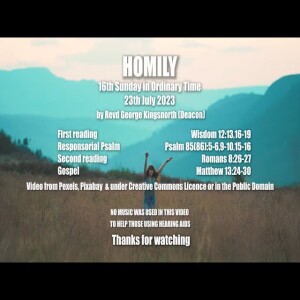
Friday Jul 21, 2023
Homily 16th Sunday in Ordinary Time - Sunday 23rd July 2023
Friday Jul 21, 2023
Friday Jul 21, 2023
Homily16th Sunday in Ordinary TimeSunday 23rd July 2023The Gospel for this Sunday is about the Sower who sowed good seed, but the evil one went in at night to sow weeds. When servants asked if they should pull up the weeds, they were told to leave them there until the harvest time so that the wheat could grow to maturity. Once the harvest is ready the weeds could be easily identified and gathered first to be thrown into the furnace.Jesus then explains the parable to his disciples saying the Sower is the Son of Man and that the field represents the world. The good seed is the people of God’s kingdom, and the darnel are subjects of the evil one. It was the devil who sowed the darnel seeds. At the end of time, Jesus will send his angels to gather the evil one’s subjects, those who do evil and provoke offence and will cast them down to hell, in the eternal furnace. Then the virtuous will shine like the sun in God’s kingdom.This life is a challenge, we are not left alone in this world. God provides each of us with a guardian angel, who is there to help defend us against the snares of the evil one, the Devil. The Holy Spirit also guides us to move in the right direction. Our lives are not meaningless once we realise that we have been sent into this world for a purpose, the help spread the good news and to share the love of God with others.There has been no time in history when the whole world has been shut away and cut off from others as we have seen in recent years. The lockdowns imposed because of COVID isolate us all. The experience has had a profound effect on so many people adding fear of going out and being with others. Yet humans are social creatures, we need the company of others. We see it in family gatherings when grandparents can be with their children and their grandchildren. The Fourth Sunday in July has been dedicated to grandparents and the elderly, honouring Jesus’s grandparents Saints Joachim and Anne, Our Lady’s parents. The strong bonds are forged where families, one generation after another, can share their lives and support one another in both good times and hard.When families get together and share their stories, the young learn about the tales of the old, often funny because these stories have an impact on the lives of the ones they love. It gives them a sense of who they are and who they would like to be. Families provide boundaries which also helps with the development of the younger ones, showing what is right and wrong.Our loving Father provides those boundaries in the Ten Commandments, ten simple rules that allow us to lead a fruitful life. Jesus encouraged his followers to keep those commandments and provide two more simple rules, the first was to Love the Lord our God with all our heart, our mind, and our soul; and the second was to love our neighbour as we love ourselves. By keeping these two commandments we also will be keeping God’s Ten Commandments, which are, as he says.1) To know “I am” the Lord your God: you shall not have strange Gods before me.2) You shall not take the name of the Lod your God in vain.3) Remember to keep holy the Lord’s Day.4) Honour your father and your mother.5) You shall not kill.6) You shall not commit adultery.7) You shall not steal.8) You shall not bear false witness against your neighbour.9) You shall not covet your neighbour’s wife.10) You shall not covet your neighbour’s goods.Today many seem to have forgotten those simple rules. Today’s Gospel tells us that the evil one has sown his seeds to confuse us, and many have been led astray. St Paul says that if we chose to be unspiritual, we are being led towards death because the unspiritual is the fruit of the evil one’s seeds. Though being spiritual is a challenge in today’s materialist and scientific world that rely on objective measurements, if we accept Jesus as Our Lord and trust in him, we will live and God will be with us. Many of us can be made weary of this life, but the Spirit will help us in our weaknesses and can make our plea to God when the words are hard for us to find to express our needs. We must be reassured that God knows everything in our hearts and gives us the free will to choose. All he asks is we trust in him.In the book of Wisdom, we are told there is no god but Our Lord who cares for everything. No matter how much we may be told there are, these are false claims. Our God is the only Judge, and because of his sovereign power he can be and is lenient with us. If we are virtuous, we will keep Jesus’s commandment to love our neighbours. God knows we get things wrong and often go astray into sin, but he also grants us, through his love for us, to be able to repent and turn back to him. Amen.
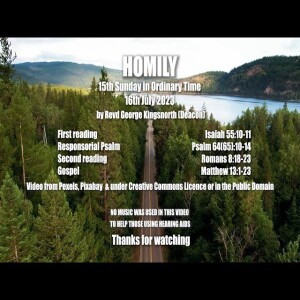
Friday Jul 14, 2023
Homily - 15th Sunday in Ordinary Time - Sunday 16th July 2023
Friday Jul 14, 2023
Friday Jul 14, 2023
Homily15th Sunday in Ordinary TimeSunday 16th July 2023As I start to write my Homily for this week it is pouring rain outside. Thankfully, I had the state of mind last night to cut the grass before it grew too long. The tasks in the garden are never-ending. The moment you do one thing there are dozens more to do. On one side, an invasion of ivy creeping over the neighbour’s fence trying to grip hold of my log cabin. On the other side, Horsetail spreads fast. We also have a Passionflower that started to sprout up in various parts of the garden. June had dry weeks, but the plants still needed to be watered. Thankfully, we have a water butt to collect rainwater for the plants during hot months. Here in Ireland, the rain never seems to be far away.My elderly mum has for eleven years managed our garden. This is her passion and joy. But as the years go by, she is struggling to do what is required and can feel overwhelmed by the extent of work to be done. More hands are needed. We’ve tried to get some maintenance gardeners, but this hasn’t worked. Everyone is under pressure and often the garden is not the top priority. When my father was alive, he had an allotment. If you had set up a timelapse camera over a couple of years, you would have seen a wave flowing from the shed straight down to the bottom of the plots as each season had its planting, growth, and harvest period. Then a little time for rest so the soil could be rejuvenated. In summer, our garden in Ireland gets decked out with fold-up chairs, a table, and a large umbrella that shield from the sun. Family and friends gather to chat, drink wine and taste cakes. There would always be joy and laughter.Isaiah tells how God pours rain from heaven, allowing the seed to grow. After the harvest, flour can be milled, and bread can be baked. The rain’s purpose is to yield fruit from the seed. In Matthew’s Gospel, Jesus asks those assembled to imagine a Sower sowing seed which fell in different places. Some at the edge of a path, on a patch of rocks, also amongst the thorns and others on rich soil. Birds ate the seed by the path, and the sun-scorched those on the rocks. The seeds amongst the weeds grew but were strangled. Only those in the rich soil yielded a harvest.Our world today, through the media, presents many stories that carry our imagination away as the evil one does with the seeds near the path. Others hear what God has to say, and initially rejoice but when things get tough abandon their faith. Everyone can get confused by the pressures put upon them through hard work but getting less money, not covering the monthly bills. Others are encouraged by self-help books to better themselves or to seek wealth through various schemes. Today we see many workers on strike because they struggle to make ends meet. Many have several jobs and still struggle. The media is used to encourage audiences to see how many suffer because of reduced services, playing on our self-interests to encourage the strikers back to work. Yet, the system is broken in every part of society and people are getting angry, as crisis after crisis wears us all down in the hope of accepting the status quo.Many people struggle with anxiety and depression, regardless of their area of work or lack of. Young families move away from their grandparents to seek work, with both parents trying to manage work and their young children, often without the support they need. Others find themselves overwhelmed by the pressures of life they cannot see when they could possibly have children. The family is gradually being corroded. Some have given up everything for material riches and success but with nothing we came into the world and with nothing l we leave it.Yet, where the rain from Heaven falls on rich soil, where the seed of the Word is allowed to grow, those people put their trust in God, aware that although this life can be hard, they are waiting for the Glory of God’s son to be revealed. St Paul tells us this life is like the act of giving birth, forcing us to groan as we inwardly wait to be set free as the first fruits of the Spirit. We are not alone when we trust in God, and follow his will, not our own. We are sent here into this life with a mission. If we accept the Word of God and take it into our hearts, we will carry out God’s will and return to him having been successful in what we were sent here to do. To sow the seeds of the Lord so everyone can hear and believe in Him. Amen.
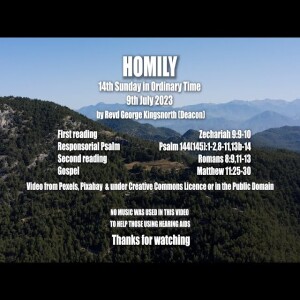
Friday Jul 07, 2023
Homily 14th Sunday in Ordinary Time - Sunday 9th July 2023
Friday Jul 07, 2023
Friday Jul 07, 2023
Homily 14th Sunday in Ordinary TimeSunday 9th July 2023This Sunday's Gospel is used regularly in Requiem Masses. The last paragraph asks us to seek Our Lord when we're overburdened as he will give us rest. There is much we can learn from Jesus in how to approach life through his gentleness and humility of heart. To do so we will find rest for our souls.Zechariah tells us what the Lord said about his son’s triumphant entrance into Jerusalem, on Palm Sunday. Everyone saw him as a leader, even though he rode on the donkey. His kingdom would span the entire planet bringing peace to all nations. A week later he would be crucified. All were bewildered, not yet understanding Jesus’s mission to die on the cross, as the sacrificial lamb who takes away our sins. His sacrifice, the only one acceptable to God, is our only hope of getting into heaven if we believe in him.St Paul tells us not to focus on unspiritual things, what we call materialism, as the Spirit of God won't want to rest within us, and we will be as good as dead. By chance, I found myself reading G. K. Chesterton’s book ‘Orthodoxy’, he is also the author of the Father Brown detective stories. Chesterton called one chapter ‘The Maniac’, where he discusses how many publishers encouraged their readers to believe in themselves, to get on in life. To become Supermen. Chesterton suggests such men who believe in themselves are all in lunatic asylums. These asylums, however, are not necessarily institutions of bricks and mortar but the prisons they have created for themselves, because they have become lost in the pursuit of materialistic wealth or understanding, forgetting, or denying their own spiritual well-being. If you study science, the first thing you are asked to do is throw God out of the picture.Chesterton argues that, and I quote: “Modern Master of Science are much impressed with the need of beginning all inquiry with a fact. The ancient Masters of Religion were quite equally impressed with that necessity. They began with the fact of sin – a fact as practical as potatoes”. End quote. As Chesterton continues, he criticises the common assumption of his day that imagination is dangerous to our minds. He suggests that the creatives are not the ones who go insane but those who focus on everything logically. The former are happy to look at all possibilities realising the universe is limitless, yet those of a scientific mindset put limits in place to take measurements. Chesterton argues, “The Christian is quite free to believe that there is a considerable amount of settled order and inevitable development in the universe. But the materialist is not allowed to admit into his spotless machine the slightest speck of spiritualism or miracle”.Chesterton looks at the symbolism of a circle which though seemingly endless, is bound to consistently return to a starting point to repeat another cycle. Whereas a cross, though colliding at its centre, one bar across the other, has four arms that can stretch out endlessly without changing its shape. What interested me was that Chesterton was commenting on the madness of materialism in 1908, arguing that whoever pursues materialism ends up being locked up in their own echo chamber of investigation, attempting to fathom out the universe but constantly battling against never-ending mysteries. Whereas the Christian who recognises the spiritual can discover everything because they have accepted the mystery of God.Today, much of our time can be locked up in materialistic things, such as mobiles, and computer games. Many have turned inward looking upon themselves, as though they are the centre of the universe. A games-engine cycles the player through different activities but is limited in the scope of the virtual world. I remember watching one of my sons, who had become bored with a racing game, attempt to discover what happens if you chose a different path. The boundaries kept him in place until he conformed to the rules of the game. Yet, I see my grandchildren exploring the world around them because, as yet no limits to their imagination have been imposed, so they can delight in the mystery, without needing to fully understand and simply enjoy what their imaginations bring to them. They sing, create their own songs, experiment with the things around them and are happy in the present without worrying about their future.These children live in the Spirit and are alive. All is revealed to mere children. We who may think we are learned must at times put away what we think we have learnt, to experience the world once again as children and rekindle the spirit within us. We should allow our imaginations to roam free, then we will no longer be dead in spirit but alive. To do this we should let go of the unspiritual grip of materialism and open ourselves to the Spirit of God so he can make his home in us. ReferencesChesterton, G. K. (2018). Orthodoxy. Caracas: CreateSpace Independent Publishing Platform. pp.154.


